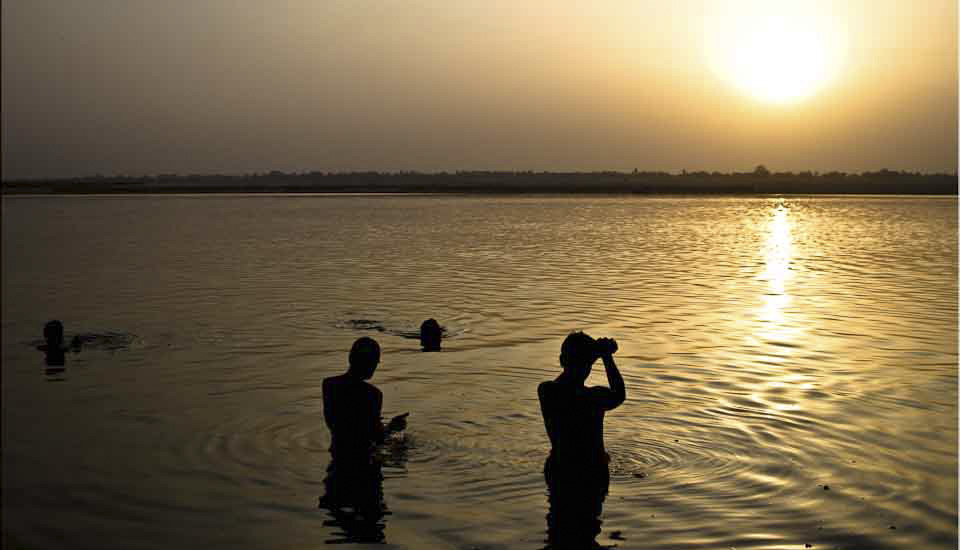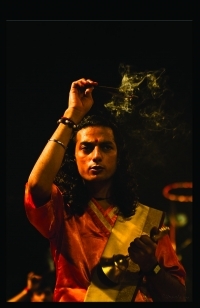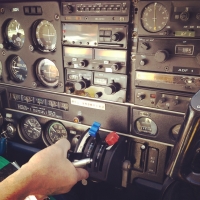.jpg)
The Prayer-Flag Hanger
For centuries, Boudhanath Stupa has been an important pilgrimage site for Tibetan Buddhists. So, prayer flags hung there are particularly auspicious; but they don’t hang themselves!
Dancing on the wind, dispersing prayers, mantras, and general good will across the landscape, strings of prayer flags hang to the four corners of Boudhanath Stupa.
Somewhere, amongst them, were mine!
Prayer flags are said to date back to the battle flags used by the Gautama Buddha in the fight against the asuras – malevolent divine beings considered by Indian mythology to be enemies of the gods. Ubiquitous in the Tibetan Buddhist world (e.g.: Prayers on the Wind: Bhutan), prayer flags come in different styles and shapes, but the most commonly seen are the Lungta (wind horse) flags. These colourful squares of cloth are woodblock-printed with sacred images, sutras and mantras, and hung horizontally in sets of five. The five fabric colours represent the five elements and the Five Pure Lights: blue is for the sky and space, white stands for the air and wind, red is fire, green depicts water, and yellow symbolises earth. Keeping these five elements balanced is thought to produce health and harmony.
Prayer flags are believed to release peace, compassion, strength, and wisdom into the very air, bringing benefit to everyone. They can also include prayers for a long life of good fortune on behalf of the person who supplies them.
What could be more auspicious, then, than adding one’s prayers to all of those fluttering under the careful watch of the Buddha’s eyes at the Boudhanath Stupa in the heart of Kathmandu!
While I was in Nepal as part of a group with travel photographer Gavin Gough and photojournalist Jack Kurtz, our guide Angfula Sherpa organised a batch of flags for us. At lunch tables, overlooking the magnificent stupa that is part of the Kathmandu Valley UNESCO World Heritage Listing, we all wrote our own messages on the freshly printed squares.
We then watched in fascination as the designated prayer-flag-hanger tied lengths of flags together, climbed to the top of the 36 metre (118 ft) dome, secured one end of the bundled flags to the gilded spire, let the bundles unravel to the lower landings, and then secured the other ends to the outer corners of the complex.
That accomplished, our prayers were free to mingle with all the other positive vibes dancing across the Kathmandu Valley and beyond, to all the pervading space in the six worldly realms.
.jpg)
Prayers Flags and the Eyes of the Buddha
My accommodation was a short walk from the magnificent stupa, so I took every opportunity to visit it at different times of day. (iPhone6)
.jpg)
The Stupa
One of the largest Buddhist stupas in the world, this iconic structure stands tall over the surrounding skyline. It was badly damaged by the horrific April 2015 Nepal Earthquake, but the site is of such importance that repairs (costing 230 million Nepalese Rupees – about $USD 2,000,000) were begun almost immediately.

Flags on Boudhanath
The all-seeing eyes face in four directions, and – like the eyes in a painting – follow your progression around the temple.

Bundled Prayer Flags
Flags come in numerous different sizes, but the order of the colours (blue, white, red, green and yellow) is invariable. Wooden block printing is the preferred means of printing the patterns, but some are now screen printed.

Plane over Boudhanath
The thirteen tiers that form the pyramid at the top of the stupa symbolise the thirteen steps of initiation leading to enlightenment. The lacy gilded canopy atop the steps stands for the air, and the spire is the fifth element in Buddhist philosophy: space or “ether”. We are near a flight path, and regular jets use that space to fly over us and out of the valley.

Flags on the Landing
Before anyone begins the long climb up the restricted area to the top of the stupa, the ends of each flag section have to be tied together.

Angfula and the Prayer Flags
Our guide keeps an eye on the whole process.

Ang on the Landing
Lime powder is mixed with water to make a lime wash, which is carried up to the top, and poured down over the dome periodically.

Flags Dropping Down
Saffron water is then thrown over the whitewash by a worker skilled in making the arches, creating a decorative lotus petal pattern.

Unfurling Flags

Guiding the Flags
The whole process of affixing the flags is quite labour-intensive; …

Flags on the Stupa
… each string has to be guided across each landing ….

At the Edge of the Stupa
… and out to the perimeters of the stupa …

Affixing the Flags
… where they are carefully tied on.

Flags at the Corner

On the Landing
With a diameter exceeding 100 metes (328 feet), the stupa is huge. Outside the base, the shops and restaurants are almost as fascinating as the stupa itself. The nine levels of the stupa represent the mythical Mt. Meru, centre of the Tibetan Buddhist cosmos.

Guiding the Prayer Flags
The whole process of attaching the long strands is repeated, over and over, as fresh flags are continually added.

Flags on the Wind
The wind horse, in picture or in words, is the central element of a Lungta flag.

Flags on the Wire
The outside corners of the flag are guarded by symbols or drawings of the four great animals: Garuda, dragon, tiger, and snow lion, and the texts are usually a collection of mantras or a short sutra.

Flags to the Gilded Spire
More than 30kg of gold were used to repair the badly-damaged golden spire.

Flags to the Spire of Boudhanath
The Spring skies darken overhead, as the eyes of the stupa keep watch.

Boudhanath under Storm Clouds
The crowds at the base thin, as people start to head home, …

Overloaded!
… grabbing any public-transport they can find before the rains get serious.
The air was full of prayers and rain as I dodged rubble and puddles walking back to my hotel.

The beauty of staying so close was that I was able to visit repeatedly, checking out the different moods and activities happening at different times of day (e.g.: Light a Candle).
Each visit, I looked up – up to the flags fluttering overhead, sending good will into the atmosphere.
Auṃ Maṇi Bêmê Hūṃ – ཨོཾ་མ་ཎི་པ་དྨེ་ཧཱུྃ – “The jewel is in the lotus.”
Pictures: 10March2017


























.png)

